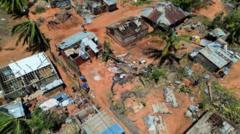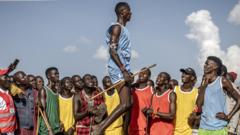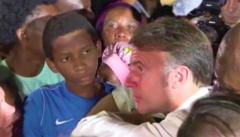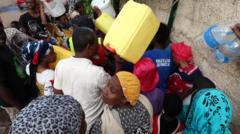Cyclone Chido has wreaked havoc on Mayotte, leaving a significant humanitarian crisis in its wake as residents grapple with food and water shortages. While government officials scramble to provide assistance, the cyclone has also reignited debates over France's immigration policies and investment in the territory.
Mayotte Faces Devastation as Cyclone Chido Strikes: A Humanitarian Crisis Unfolds
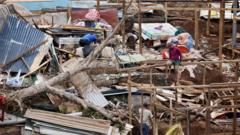
Mayotte Faces Devastation as Cyclone Chido Strikes: A Humanitarian Crisis Unfolds
The aftermath of Cyclone Chido reveals extensive destruction in Mayotte, raising concerns over aid and governance as residents struggle without essential resources.
As we survey the damage left in the wake of Cyclone Chido over Petite-Terre, it is evident that Mayotte, a French territory in the Indian Ocean, has suffered catastrophic losses. The storm, which struck on Saturday with winds exceeding 220 km/h, has transformed thriving hills into barren landscapes. The once-bustling coconut groves now lie in ashes, with uprooted trees and a mangled airport signal tower serving as stark reminders of the cyclone's intensity.
French authorities have unfortunately confirmed at least 31 deaths, with thousands of residents unaccounted for, which raises alarms that this toll could grow. A state of exceptional natural disaster has been declared to facilitate aid efforts, as Mayotte is characterized as one of France's impoverished regions, home to many living in precarious conditions.
French President Emmanuel Macron is expected to visit the devastated areas with urgent supplies amid ongoing debates about migration, which complicate the situation further. While Macron brings much-needed food and health resources, there is criticism that his government has historically underfunded Mayotte. Some argue that this lack of investment contributed to the severity of the cyclone's impact. Amid this backdrop, calls to extend aid have been met with resistance from some factions in France fearing that too much support could incentivize illegal migration.
The immediate humanitarian needs in Mayotte are pressing, with tens of thousands currently lacking access to clean water and food. Reports suggest that a newly instituted curfew to prevent looting complicates the already difficult living conditions, and the community has suffered from shortages as shops begin to ration supplies.
Emergency services are working diligently to distribute essential resources while also restoring damaged facilities, particularly crucial water plants which are currently incapacitated. Health officials are expressing concerns over the outbreak of infectious diseases, a potential consequence of unsanitary conditions caused by the storm's devastation.
Cyclone Chido, deemed the most destructive storm to strike Mayotte in 90 years, left an indelible mark on both the environment and the social fabric of the territory. Following Mayotte, the cyclone moved to the African continent, claiming additional lives in Mozambique and Malawi, amplifying the tragedy across the region.
French authorities have unfortunately confirmed at least 31 deaths, with thousands of residents unaccounted for, which raises alarms that this toll could grow. A state of exceptional natural disaster has been declared to facilitate aid efforts, as Mayotte is characterized as one of France's impoverished regions, home to many living in precarious conditions.
French President Emmanuel Macron is expected to visit the devastated areas with urgent supplies amid ongoing debates about migration, which complicate the situation further. While Macron brings much-needed food and health resources, there is criticism that his government has historically underfunded Mayotte. Some argue that this lack of investment contributed to the severity of the cyclone's impact. Amid this backdrop, calls to extend aid have been met with resistance from some factions in France fearing that too much support could incentivize illegal migration.
The immediate humanitarian needs in Mayotte are pressing, with tens of thousands currently lacking access to clean water and food. Reports suggest that a newly instituted curfew to prevent looting complicates the already difficult living conditions, and the community has suffered from shortages as shops begin to ration supplies.
Emergency services are working diligently to distribute essential resources while also restoring damaged facilities, particularly crucial water plants which are currently incapacitated. Health officials are expressing concerns over the outbreak of infectious diseases, a potential consequence of unsanitary conditions caused by the storm's devastation.
Cyclone Chido, deemed the most destructive storm to strike Mayotte in 90 years, left an indelible mark on both the environment and the social fabric of the territory. Following Mayotte, the cyclone moved to the African continent, claiming additional lives in Mozambique and Malawi, amplifying the tragedy across the region.

